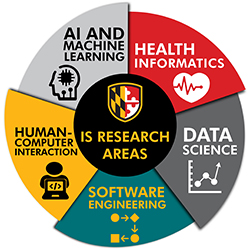Public Research for Public Good
UMBC is a public research university leading the world in inclusive excellence in research. Our research aims to further innovation in Information Systems through inclusive interdisciplinary partnerships and collaborations. We are committed to recruiting and retaining faculty with a passion for civically engaged research.
$3.7 Million+ in FY22
A list of externally funded projects from national, regional and local organizations.
NSF CAREER Award Winners
CAREER Awards are among the National Science Foundation’s (NSF) most prestigious.
Research Centers
The IS Department is home to four innovative research centers; fostering interdisciplinary research and innovation, teaching and mentoring, and community engaged scholarship and service across UMBC and beyond.
Center for Real-time Distributed Sensing and Autonomy
Center for Accelerated Real Time Analytics
Institute for Harnessing Data and Model Revolution in the Polar Regions
Interactive Systems Research Center
Center for Scalable Data and Computational Science
Center for Research in Use-Inspired Cyber-Physical Systems
Research Areas
Our faculty conduct interdisciplinary research in five complementary, core areas to design, develop and implement Information Systems to investigate real world problems, including climate change, cybersecurity, accessibility, and the future of work.
Study of AI techniques for language, vision, and sensor processing and fair machine learning.
Study of data lifecycle processes, big data analytics, cybersecurity analytics, and data mining.
Study of informatics and information technology to serve healthcare.
Study of the design and use of interactive technology.

Study of the people, processes, and techniques that create robust software applications.
Student Research
We are committed to mentoring students in research. Participating in research helps students develop their critical thinking, build transferable skills, and explore potential careers. The mentoring relationships built between students and faculty can last a lifetime and benefit both parties.
The department now uses a central form to collect research interests from our undergraduate and graduate students to help match students with projects (or opportunities) supervised by IS faculty. Please use this form, instead of direct email to individual faculty, to express your interest in conducting research with IS faculty. If a faculty member is interested in working with you, they will contact you directly.